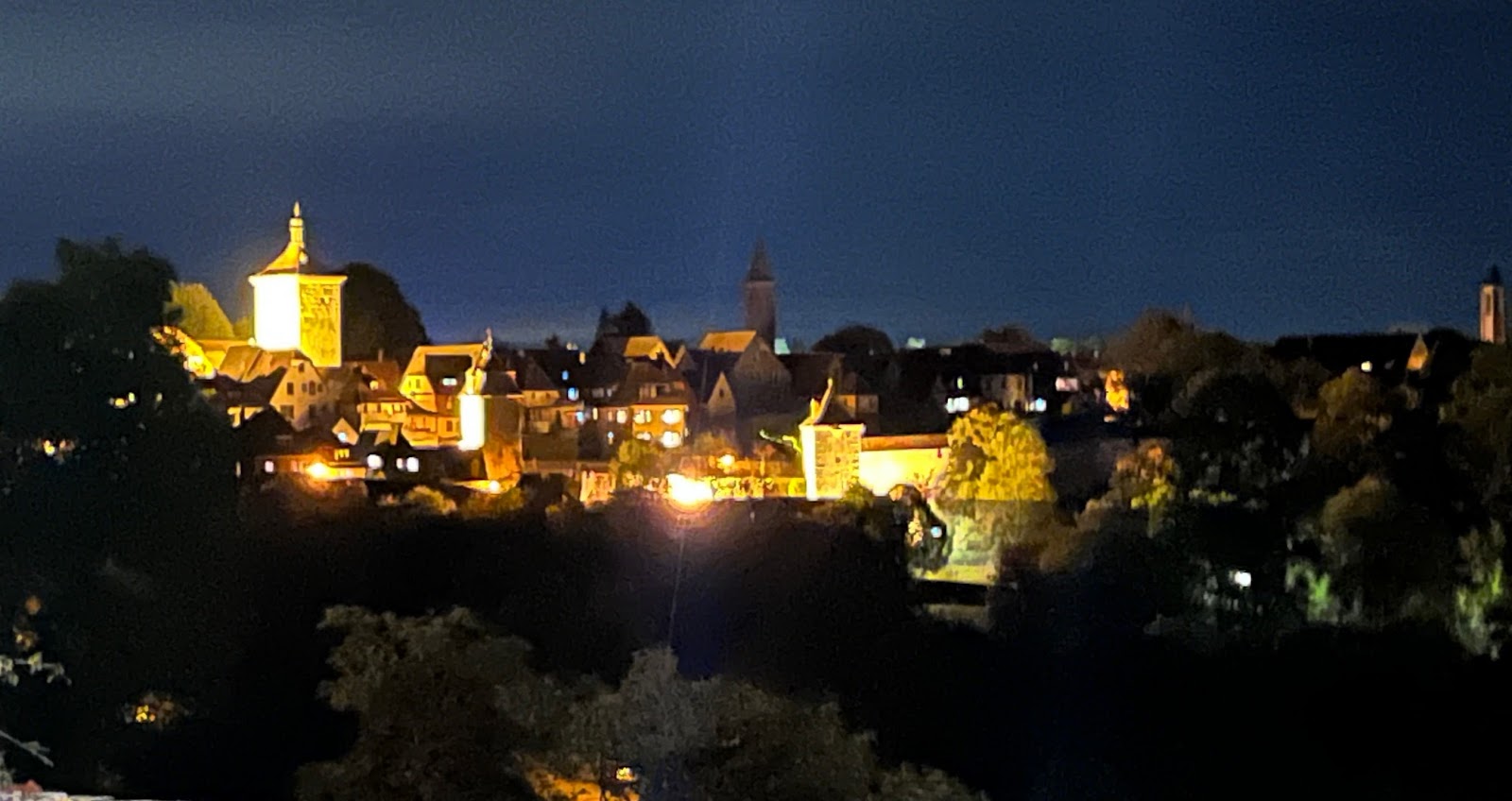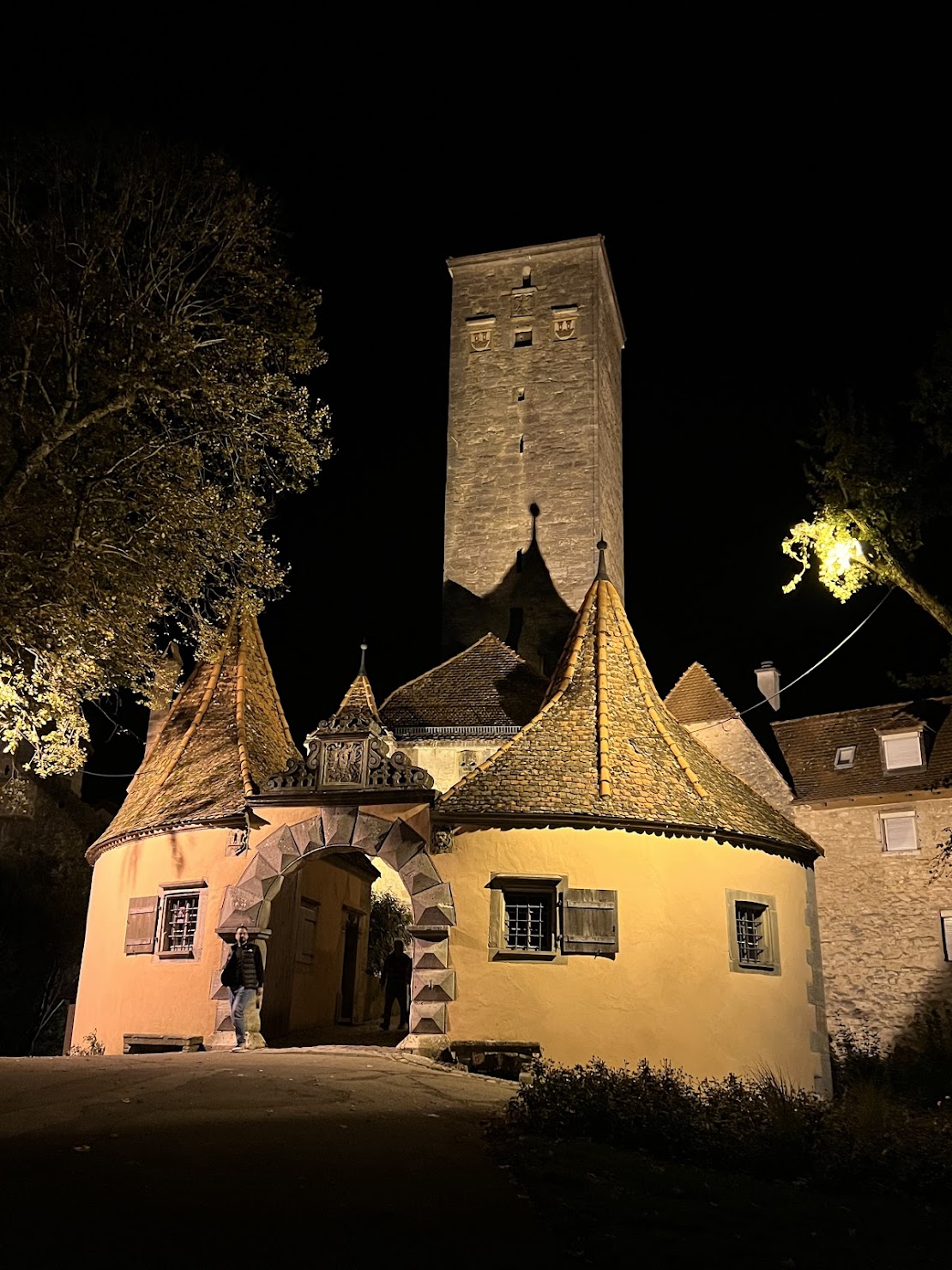October 9, 2024
The Night Watchman brushes his long black cape aside as he gestures out over the ramparts. A constellation of encircling house lights crowns the wooded valley below, barely piercing the darkness that enfolds the countryside.
“In the 1600’s, during the Thirty Years War, security was a priority,” he says. “Enemies were everywhere. So, we are high on a hill, surrounded by thick walls and guard towers. But the enemies breached the walls and brought the plague. They stayed in our homes and took our food and our women.” He looks around our circle of tourists with a rueful smile. “Don’t be fooled. There were no ‘good old days.’
It's a message I need to hear because nostalgia for other times is a refuge I often turn to. But for now, Dave and I are exactly where we want to be, in the dark of this historic German village, held in thrall by a master storyteller.
“For 250 years, the town went silent. 250 years of nothing. There was no money to repair or modernize. Nothing changed. Rothenburg was preserved by poverty. Eventually, artists discovered us… and the tourists followed. So, I thank you all for coming.”
Twenty years ago, in October, 2005, Casey, Dave and I arrived in this village in flip flops and summer garb after a month’s sabbatical in Italy. Casey was down-spirited and snuffly with a terrible cold, and we were ill-prepared for damp, chilly weather. Still, as we hunched our shoulders against a drizzling rain while trudging from the tiny train station, my daughter’s face lit up as the town came into view.
For Rothenburg ob der Tauber is magical, a fortified Medieval village, near frozen in time. To wander its narrow cobblestone streets between pastel-hued homes with steep pitched, red-tiled rooves and exposed beams is to enter a fairytale.
Once settled into our B & B, the 600-year-old home of our host, musician and inventor, Norry Raidel, shopping for shoes and cozier clothes was a priority. As promising as were several enticing window displays of comfortable shoes at reasonable prices, every shoe store we passed was closed for the day. Casey was drooping, discouraged, and needed a nap, but in the absence of warm shoes, sweaters were a necessity.
We turned down a side street and stopped in a store tended by a lanky, long-haired proprietor and his wife. Casey tried on a soft zip-up of heather brown and loved it, while the sweater I tried was bulky and a bit itchy. “Looks good,” said the owner, but I shook my head and returned it to the shelf. For the time being, I’d wear layers.
That evening, after a snooze and dinner, the three of us waited in the central square, the Marktplatz, for an 8:00 tour to help us learn some history and get our bearings. From a side alley, our guide swept toward us, his Medieval cloak swirling about his legs, his long hair flowing over his shoulders. With every stride, he rapped the cobblestones with an axe-headed staff. Once he reached our group, he held up his lantern to better see my face and said, “You should have bought the sweater.”
Shop proprietor by day, Hans Georg Baumgartner has been conducting the Night Watchman Tour in Rothenburg ob der Tauber for decades. Like us, he is twenty years older, and but for his graying hair, looks much the same in his cape and wide-brimmed hat. The blade on his staff is curved, wicked, and deadly sharp – more so than I remember. He notes my gaze and explains, “Necessary for Night Watchmen. All of the good people were asleep in their beds, and those were superstitious times. Who knew what was out in the dark?”
As he had in 2005, the Night Watchman told us the trials of this small village did not end in the 17th century. During World War II, Nazis held the town, and on March 31, 1945, U.S. bombers destroyed a third of the homes, walls, and municipal buildings. 36 people were killed. In mid-April, the Allies received an order to finish the job. But John J. McCloy, Assistant Secretary of War, was reluctant; throughout his childhood, he’d been captivated by a painting of Rothenburg purchased by his mother during her travels. Rather than proceed with the order to demolish, he persuaded his commanding officer to allow him to try to negotiate a surrender.
In recent months, human events feel like a dominoes affair, a set-up where a flick on one tottering tile sends the rest in a serpentine tumble, changing all that was. I suppose the citizens living in 1940’s Rothenburg felt that way too, little knowing the conversations at play in the Allied encampment beyond their city's walls.
During the ‘70’s, Dave and I were entranced by the charm of this place we’d discovered while backpacking through Europe. So, we bought a souvenir, an etching of Rothenburg that has hung in our bedroom ever since. It fills me with wonder to reflect on the ripples set in motion from the moment McCloy’s mother wandered into a gallery, browsed as we had, and selected a painting that, years later, succeeded in saving the town.















